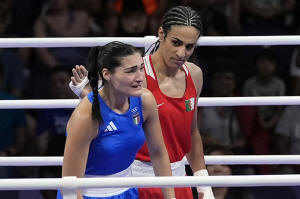The darker side of the rise of
women’s sports: With more visibility comes more online harassment
 Send a link to a friend
Send a link to a friend
 [December 19, 2024]
NOREEN NASIR and BRITTANY PETERSON [December 19, 2024]
NOREEN NASIR and BRITTANY PETERSON
NEW YORK (AP) — For Djaniele Taylor, attending WNBA games was the
perfect way to rediscover a sense of community coming out of the
long slog of pandemic-era lockdowns.
The 38-year-old Evanston, Illinois, resident has regularly attended
Chicago Sky games for the last three seasons, after she watched the
team win its first championship in 2021. As a queer Black fan, she
felt the games were a supportive and safe sporting environment.
“I was hooked and I loved the atmosphere — it was very
queer-friendly, very family-oriented, very diverse,” she said.
As the popularity of the WNBA skyrocketed this year, Taylor watched
the price of her season tickets more than double since 2022. With
the growth, she noted a “darker vibe shift,” too: What always felt
like a positive setting started to take a more hostile turn at
times.
As women's sports set new records for attendance and viewership,
Taylor and other longtime fans watched with optimism — and unease.
It’s a cycle female athletes and fans of women’s sports have come to
recognize: With the increased and sought-after visibility also comes
added scrutiny — as well as harassment and online abuse toward some
players.
This year, fresh off the NCAA spotlight, former college basketball
stars Caitlin Clark and Angel Reese made their WNBA debut for the
Indiana Fever and the Chicago Sky, catapulting their personal brands
as well as the popularity of the league among viewers.
Fans are tuning in for the love of the sport, as they always have,
said Amira Rose Davis, assistant professor in the Department of
African and African Diaspora Studies at the University of
Texas-Austin. But they’re also drawn by the dynamics between players
like Clark and Reese, who faced each other in the 2023 NCAA
championship between the University of Iowa and Louisiana State
University.
While both deny there's any bad blood between them, tension has been
drummed up by fans and increased media attention. Beneath it are
racial undertones that originated while the two played in college —
with predominantly white Iowa pitted against predominantly Black
LSU, and Clark and Reese “emerging as these kind of archetypes that
people can run with,” Davis said.
“That really raises the engagement and just the raw numbers of
viewership. And then it also solidifies those narratives,” she said.
It's also led to harassment and abuse — much of it racially
motivated and directed at players of color across the league and the
wider sports landscape.
“Angel and Caitlin have given us an incredible platform to talk
about how we treat Black and white athletes differently in the
media,” said E.R. Fightmaster, co-host of Jockular, a podcast on the
intersection of women’s sports and queer identity.
During the playoff matchup in September between the Connecticut Sun
and Indiana Fever, the Sun’s DiJonai Carrington posted an email she
received with a racial slur and graphic death and sexual assault
threats.
Her teammate, Alyssa Thomas, shared her own experience.
“In my 11-year career, I’ve never experienced racial comments (like)
from the Indiana Fever fan base,” Thomas said, after the Sun
eliminated the Fever from the playoffs.
For her part, Clark has disavowed the toxic discourse, though some
say she hasn't done enough to try to rein in the racism by some of
her Indiana Fever fans.
“People should not be using my name to push those agendas. It’s
disappointing. It’s not acceptable,” Clark said back in June.
”Treating every single woman in this league with the same amount of
respect, I think, it’s just a basic human thing that everybody
should do.”

At the end of the 2024 season after facing some criticism for
initially failing to condemn the harassment, WNBA Commissioner Cathy
Engelbert said, “There’s no place in sports for this," and vowed to
attack it "multidimensionally.”
The league should have done a better job preparing for the
harassment, said Frankie de la Cretaz, a freelance writer whose work
explores sports, culture and queer identity. "They should have seen
it coming based on the discourse between fans around Caitlin Clark
and Angel Reese in college.”
[to top of second column] |

Algeria's Imane Khelif, right, looks at Italy's Angela Carini,
following their women's 66kg preliminary boxing match at the 2024
Summer Olympics, Thursday, Aug. 1, 2024, in Paris, France. (AP
Photo/John Locher, File)

The NCAA released a study in October showing online
abuse toward student-athletes peaked during March Madness, with
women’s basketball players receiving three times more threats than
men’s players. For the first time in March Madness history, the
women’s championship game drew more viewers this year than the
men’s.
“It’s very exciting, of course, to see the increased visibility of
that increased popularity, but it is extremely concerning and
disappointing to see what has come along with that,” said Lynn
Holzman, vice president for NCAA women’s basketball.
A similar study found racist and sexist posts aimed at female
athletes made up nearly half of all monitored abusive posts during
the 2024 Olympic Games in Paris.
At the summer games, Algerian boxer Imane Khelif faced hateful
comments and false accusations about her gender leading up to her
gold medal win.
The false narratives, perpetuated by internet trolls and public
figures like President-elect Donald Trump and “Harry Potter” author
J. K. Rowling, highlighted how female athletes of color have faced
disproportionate scrutiny and discrimination when it comes to sex
testing and false accusations that they are male or transgender.
“People want a chance to delegitimize successful women all the time.
And so if you are a successful boxer and they can’t find anything
else to pick on, they are going to say that you are too manly to
play,” Fightmaster said.
Khelif urged an end to bullying athletes. “It can destroy people, it
can kill people’s thoughts, spirit and mind,” she said.
The issue of transgender women competing in women’s sports has been
highly polarized this year. A former University of Kentucky swimmer
was among a dozen athletes filing a federal lawsuit against the NCAA
in March, accusing it of violating Title IX rights by allowing a
transgender woman, Lia Thomas, to compete at the 2022 national
championships.
The lawsuit also cited unconfirmed reports that a transgender woman
was playing on the San Jose State women's volleyball team. This
fall, colleges began dropping out of matches with San Jose State,
which has not confirmed it has a trans woman on the team. The
Associated Press has withheld the player’s name because she has not
publicly commented on her gender identity.

But that hasn’t stopped politicians from shaping campaigns around
keeping transgender women out of women’s sports or wading into the
polarizing debate on fairness.
About half of U.S. states have a ban on transgender athletes
participating in school sports according to their gender identity.
This year, New Hampshire Gov. Chris Sununu signed a law banning
transgender athletes from grades 5-12. Ohio banned trans athletes as
young as kindergarteners. West Virginia and Idaho are looking to the
U.S. Supreme Court to support their bans.
Even as women's sports reach new heights in viewership and with it
ticket sales and lucrative deals, inequalities persist, including
disparities in pay, the quality of women's sports facilities and
online harassment of female athletes.
"It's disingenuous to me if we are going to celebrate the rise of
women's sports but not address the ways in which we're treating
women athletes differently," said Cheryl Cooky, professor of
Women's, Gender and Sexuality Studies at Purdue University.
“My hope is that the rise of women's sports can happen in absence of
the vitriolic rhetoric that we've seen.”
—-
AP Sports writers Alanis Thames and Doug Feinberg contributed.
All contents © copyright 2024 Associated Press. All rights reserved
 |